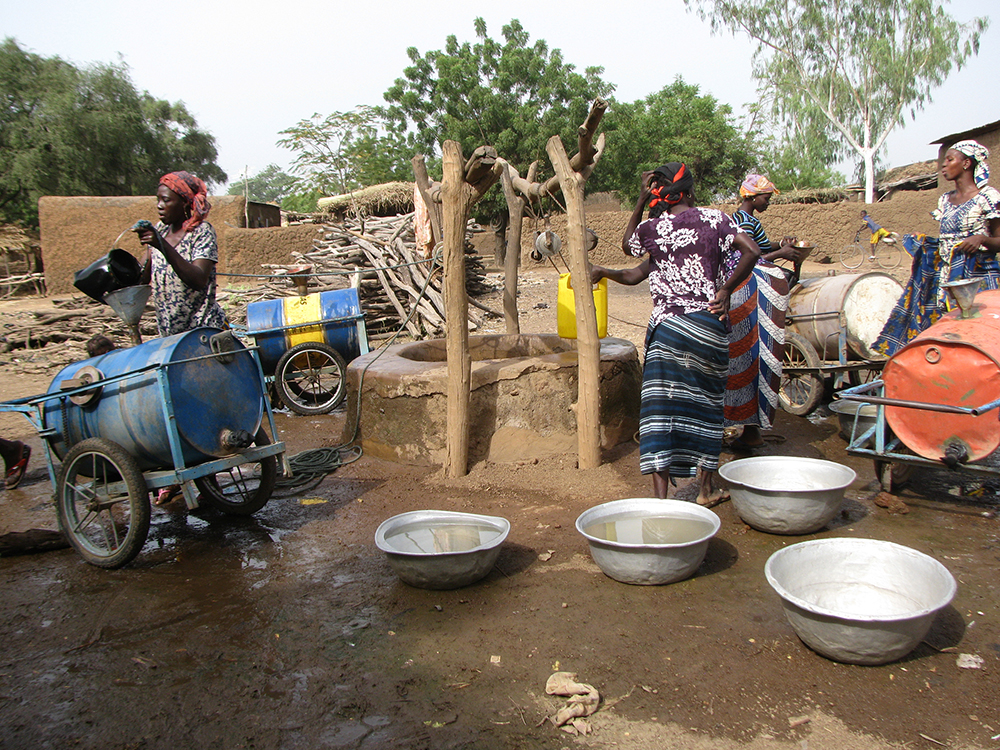Animal excreta pose a major health risk which should be addressed in water and sanitation policies. In a new policy brief, SIANI’s expert group One Health in Burkina Faso offers recommendations that can help curb the spread of zoonoses, i.e. disease and infections transmitted from animals to humans.
Many communities in Burkina Faso are facing multiple health risks, partly due to a lack of clean water and adequate sanitation. In rural areas, it is estimated that only 23% have access to proper sanitation infrastructure and many are exposed to traces of excreta from animals since most families keep livestock. Many people suffer from diarrhoea and malaria, which can lead to malnutrition. Another serious concern is the spread of zoonotic pathogens from animals to humans which contributes to a range of diseases like salmonella, e.coli, and other intestinal disorders.
Despite these serious health threats, risks related to animal excreta rarely address animal excreta in water, sanitation, and hygiene initiatives (WaSH). The situation may however be beginning to change – some WaSH interventions in Burkina Faso have incorporated both human and animal waste management. The SIANI expert group One Health in Burkina Faso has synthesized key lessons from these projects. As the expert group recently concluded its work after 1.5 years, the members presented their findings in a couple of reports and policy briefs, focusing on two main topics:
- How water, sanitation, and hygiene initiatives can help reduce the risk of zoonoses and other health risks.
- How human and animal waste can be safely recycled and used in agriculture.
Health aspects are primarily explored in the policy brief Reducing the risks of zoonoses in Burkina Faso through a One Health approach and the report Reducing Zoonosis Risks in Burkina Faso. The researchers have analyzed relevant legislation, policies, and programmes in Burkina Faso to assess how excreta management is currently addressed. Furthermore, the researchers studied existing projects to understand what the results and learnings have been. The expert group has also identified key implementation gaps and presented actionable recommendations for policymakers.
Lack of a coherent policy framework
The researchers reviewed twelve national documents related to water, sanitation and hygiene (WaSH) to assess whether current public policies and sectorial strategies address the health risks associated with animal excreta. Though the topic was occasionally mentioned, neither human nor animal excreta management were integrated into the frameworks in a coherent or cross-cutting manner. Only three legislative texts specifically address zoonotic risks associated with animal excreta. Even in technical reports to strengthen water, sanitation and hygiene initiatives, animal excreta were mentioned in only four out of fifteen documents.
Lessons from projects
The report analyses community-level sanitation projects that have integrated the management of animal excreta as well as zoonosis awareness. Two projects followed the Community-Led Total Sanitation model characterized by strong local ownership. Another project was designed in line with the Clean and Productive Village approach which combines basic sanitation with the safe agricultural reuse of human and animal excreta.
To better understand how different actors experienced the initiatives, the researchers organized focus group discussions with people from participating villages as well as a feedback workshop with various WaSH stakeholders. Most participants appreciated the initiatives and said that they had led to significant behavioural change.
”Before the arrival of the programme, we cohabited with the animals, the animals had access to the cooking areas and even dipped their mouths in the drinking water,” one participant said.
Many villagers testified that the initiative had improved the health and wellbeing of their community, while fostering stronger collaboration as people banded together to, for example, build toilets. However they also highlighted challenges, including a lack of tools and resources to sustain efforts over time.
Recommendations for policymakers
The policy brief Reducing the risks of zoonoses in Burkina Faso through a One Health approach outlines key recommendations for policymakers, with the explicit aim of reducing zoonotic risks:
- Operationalize the One Health approach in WaSH strategies. The One Health approach – integrating human, animal and environmental health – should be incorporated into WaSH strategies with a dedicated strategic framework to guide the integration of zoonotic risks.
- Improve the policy integration of zoonotic risks in WaSH policies. National hygiene and sanitation policies should incorporate animal excreta management and recognize risks associated with agropastoral practices.
- Enforce existing policies more effectively. Sanitation and environmental health regulations must be fully enforced, particularly those related to excreta and wastewater management. The focus should be placed on mitigating high-risk practices (e.g., open defecation, informal waste disposal) and encouraging the safe reuse of organic matter in agriculture within circular economy principles.
- Strengthen communication and community outreach to reach more villages. Rural areas should be prioritized since there is a high risk of zoonotic disease transmission when humans, livestock and wildlife are in close contact.
- Ensure the sustainability of WaSH community initiatives. Establish institutional, technical, and financial support mechanisms to ensure the long-term viability of community initiatives. This includes strengthening local capacity and providing material support to vulnerable households for the construction of sanitation facilities and livestock enclosures.
